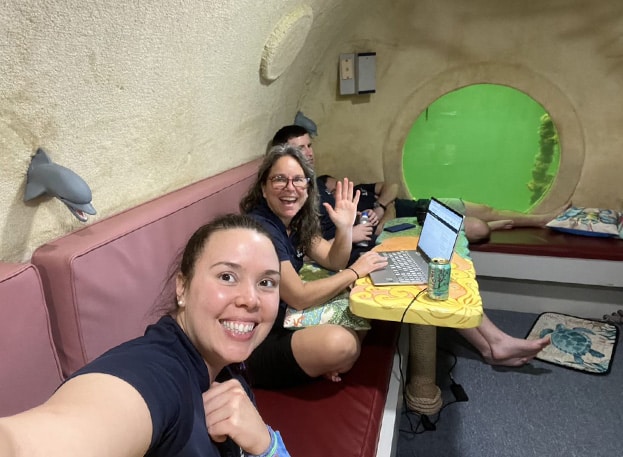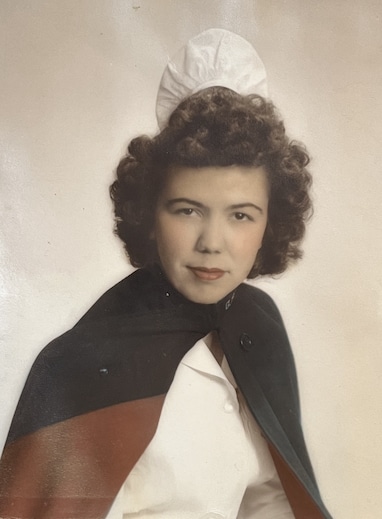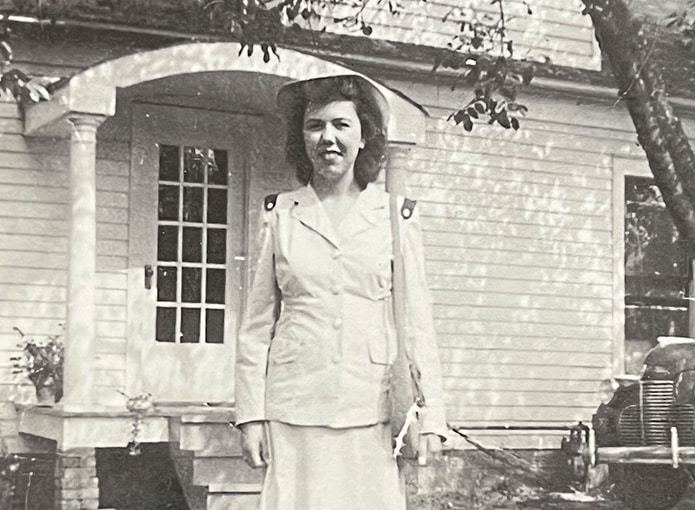Olivia’s mammaw, Billie Breeze, at home in Ashland, Kentucky. Image courtesy of Olivia Turner.
By Dr. Kristin Drexler
Faculty Member, School of STEM
with Olivia Turner
Graduate Student, Dr. Wallace E. Boston School of Business
Note: This article is the first in a series honoring Women’s History Month.
March is Women’s History Month – a month dedicated to “commemorating and encouraging the study, observance, and celebration of the vital role of women in American history.” It is a time to show an appreciation of women’s contributions and influence in the fields of physics, chemistry, medicine, and biology.
Recently, I interviewed Olivia Turner, a current graduate student here at the University. Olivia, a member of APUS Analog Research Group (AARG), has participated in space-related research for the University. At the Inflatable Lunar-Mars Analog Habitat (ILMAH) in North Dakota last year, she grew microgreens in conditions similar to our Moon and Mars.
Olivia earned a scholarship last year for her research. In January 2024, Olivia and I participated in the PIRATE mission at Jules’ Undersea Lodge in Key Largo, Florida.

Olivia is also a leader in two chapters of University student organizations. She is the President of Women in STEM (wSTEM) and Vice President of the Association of Women in Science (AWIS).
Related: Jules’ Undersea Lodge: Becoming Aquanauts on a Research Trip
The Influence of Science Teachers and a Grandmother
Dr. Drexler: Who has been your biggest influence or inspiration in wSTEM? Is there a woman whose accomplishments have been particularly impactful to you in your STEM path?
Olivia: I have many STEM influences, including my teachers in grade school and my college professors. They were very influential in developing my mind to look at and see the world differently.
My middle school science teacher, Mr. Crab, taught me to look up and reach beyond the stars. His science classes were the absolute best! I will always remember the school’s weekend trip to the Horse Cave in Hart County, Kentucky. We went spelunking, collected rock specimens and dirt, and camped in an open field, stargazing and mapping the night sky.

Another person who inspired me to love science was my maternal grandmother, Billie Breeze (Mammaw). I enjoyed the outdoors and finding different insects, lizards, birds, plants, and rocks. Whatever the Earth provided, I would bring back and share with her. Sometimes, she would be with me on our walks or hikes, and I’d share what I found on the spot.
Mammaw would always come to my 4-H school overnight stays and school presentations, and she supported me in attending summer camps. She was the head nurse for the VA Hospital in Lexington, Kentucky, and had a brilliant, quick-witted mind.
Dr. Drexler: Olivia, it’s so nice to hear your story and your inspirations! First, what are you studying right now? When do you expect to graduate and what do you hope to do once you graduate?
Olivia: I’m currently working on my master’s in management with a concentration in organizational leadership and will graduate in May 2025. After I receive my diploma, I hope to infuse some of my passion for science and research into the management field.
I want to find work within the renewable and sustainable energy industry. I would love to find something working hands-on with plants, but I am still determining where that will take me or what that looks like. Perhaps in pursuing biosystem engineering, I can find a paying fellowship or intern program and get my hands dirty again.
Dr. Drexler: Why are you passionate about STEM?
Olivia: I love to grow plants, and I also have a love of renewable and sustainable energy. The business that I currently run with my husband involves using wind energy as a partner to haul cargo from ports to job sites.
During the two ILMAH missions, I really enjoyed the beauty of watching life grow from a seed into an amazing work of art. Now, I am considering making a massive pivot into pursuing another degree in biosystem engineering with either a horticulture or agriculture focus or both.
Dr. Drexler: That’s awesome! Ok, so tell us more about what inspires you most about your grandmother.
Olivia: Mammaw was dedicated to her work. She was so kind and loving; she was very dedicated to helping others. Mammaw spent long hours nursing the men and women at the VA hospital and even continued to volunteer after her retirement.
She juggled her work life and personal life, which was a challenging feat to accomplish. I am inspired by her dedication and bring that devotion to my professional and personal work.
Dr. Drexler: How does your grandmother continue to influence you professionally, academically and personally?
Olivia: Mammaw lived through the Great Depression. She still managed to overcome the systemic disadvantages placed on women in that era.
For example, there were inadequate educational opportunities for women, so Mammaw ensured she worked smarter and harder than others. She always emphasized the importance of staying focused and doing well in our studies.
Another disadvantage for women in that era was the expectation that women would remain at home and take care of their children, rather than holding a job. Childcare was not affordable then and is still a ridiculously high expense for families. But somehow, my grandmother juggled childcare and had her career.
When women entered the workforce, they were offered inferior positions. They were paid far less than men in the workplace and had limited access to resources and opportunities to achieve higher success academically, financially, and personally. There are still the even more unfair and disproportionate experiences imposed on women of different races and ethnicities.
My Mammaw would just grin, dig in deep and keep moving forward. In her way, she broke through all of society’s expectations, which was beyond influential to me.
There is no excuse for anyone today to accept defeat, as we are afforded so many more opportunities than in previous eras. She achieved her goals, and so will I.
Mammaw inspired me to balance my passions in life professionally, academically and personally. From her, I learned that time management is everything. She kept a pocket calendar, wrote everything down, and had it all scheduled to a ‘T.’ That pocket calendar book was second to the Bible as far as its importance to her.
Today, I use my iCalendar to organize my time. I set reminders and notifications to keep me on track with work, school, and personal activities.
I also know the importance of prioritizing what matters most to me and what needs to be done versus putting others’ needs before your own. I always schedule downtime or “me” time to decompress from technology and the outside world and reconnect with myself.
“Me” time may be walking with my dog, gardening, reading a book, solving a Samurai Sudoku, napping, or participating in other activities that let me disconnect and find balance. Staying balanced and being the best version of myself is something I attribute to learning from Mammaw.
Getting Involved with Women and STEM Organizations at the University
For more information on Women’s History Month, visit their website for almost daily lectures on various topics related to women’s achievements in STEM.
Also, you can get involved in several organizations dedicated to women or scientific topics at the University. For more information, visit our student organization webpages:
- Women in STEM
- Association of Women in Science
- National Association of Environmental Professionals (NEAP)
- The Wildlife Society
- Public Health Club
About the Authors
Dr. Kristin Drexler is a full-time faculty member in the Space Studies and Earth Sciences Department. She teaches geography, environmental science, conservation of natural resources, earth and planetary sciences and sustainability for the School of STEM. She earned her Ph.D. in educational leadership at New Mexico State University with research in socioecological systems, sustainable agroecology, and community education. Her Master of Arts is in international affairs with an emphasis in natural resources management from Ohio University.
Dr. Drexler earned the Undergraduate Excellence in Teaching Award for the School of STEM (2020) and the Dr. Wallace E. Boston Leadership Award (2021). Dr. Drexler has conducted numerous community surveys in Belize and Guatemala regarding agroforestry, conservation, sustainable agriculture, and COVID-19 impacts and is a co-investigator for the multi-year research study, “A Case Study Comparison of Pandemic Experience of Indigenous Groups in the Americas.” In the late 1990s, Drexler served as a Peace Corps volunteer in Belize; she co-founded Full Basket Belize, a 501(c)(3) and has served on its Board of Directors since 2005. Drexler produced the award-winning short film “Yochi“; she also founded “Science Talks with Dr. Drexler and Friends” to assist teachers during the pandemic. Dr. Drexler also co-directs the Gila Film School and has produced seven documentary films sponsored by the U.S. Forest Service to celebrate the centennial of the Gila Wilderness this year. She also serves as a faculty advisor for the University’s wSTEM, AWIS and SACNAS chapters.
Olivia Turner is a master of management student at American Public University and also holds an associate degree in general studies from Bluegrass Community and Technical College and a bachelor’s degree in business/corporate communications from the University of Kentucky. Olivia is active in AARG, AWIS, and wSTEM and a member of the National Society of Leadership and Success (NSLS). She is the President of wSTEM and the Vice President of AWIS.

Comments are closed.